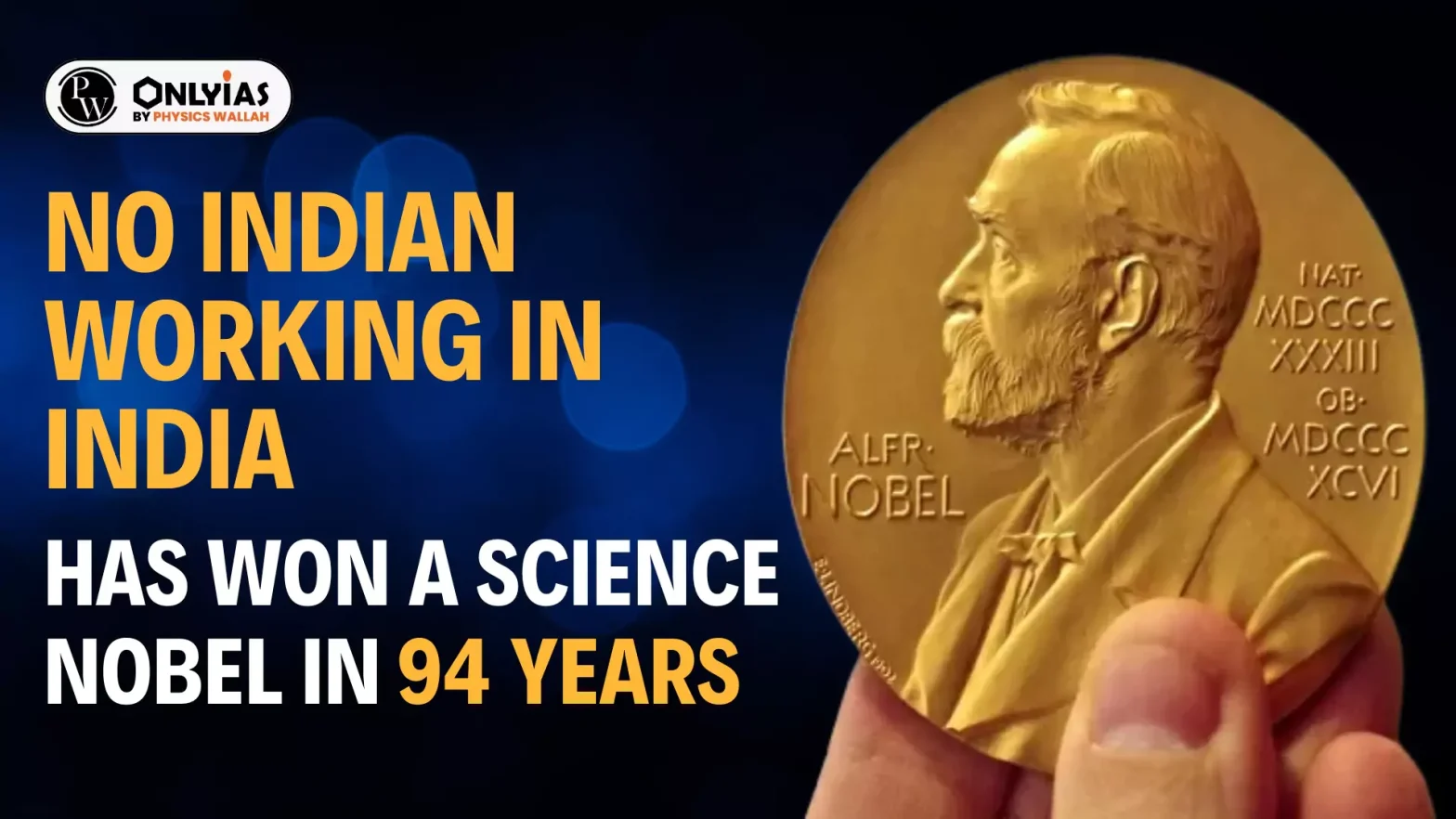Despite a strong legacy in science, India has not secured a Nobel Prize since C.V. Raman’s win in 1930. This highlights the need for a robust research ecosystem and enhanced support for innovation.
Indian Nobel Laureates in Science
- C.V. Raman is the only Indian to win a Nobel Prize in science while working in India. He received the Nobel Prize in Physics(1930).
- Other Indian-origin Nobel laureates include Hargovind Khorana (Medicine, 1968), Subrahmanyan Chandrasekhar (Physics, 1983), and Venkatraman Ramakrishnan (Chemistry, 2009), but they did their work abroad and were not Indian citizens when awarded.
Enroll now for UPSC Online Course
Challenges Hindering Scientific Advancement in India
- Inadequate Focus on Basic Research: India prioritises applied research that offers immediate results, while fundamental or Basic research, which is key to scientific breakthroughs, receives limited attention. This imbalance hinders long-term scientific progress.
- Low Public Funding: This leads to inadequate infrastructure and research resources, further curbing innovation and development.
- Bureaucratic Red Tape: Excessive administrative procedures, including cumbersome paperwork for permissions and approvals, stifle creativity and slow down the research process, making it difficult for scientists to focus solely on innovation.
- Limited Private Sector Involvement: Indian private companies lack strong incentives for investing in research and development, primarily due to fears of high risk and uncertain returns. This reduces the potential for groundbreaking discoveries.
- Decay in Research Institutions: Indian universities emphasise teaching over research, with even institutions having world-class labs underperforming compared to global leaders like MIT or Harvard.
- Low Number of Researchers: India has relatively few institutions engaged in cutting-edge research, and the number of researchers per capita is five times lower than the global average. This small talent pool reduces the likelihood of producing Nobel-worthy scientific contributions.
Also Read: Nobel Prize Winners 2024 List
Nobel Prize Nomination Process
- Not everyone can be nominated for a Nobel Prize. Each year, a select group of hundreds to thousands of individuals — including university professors, scientists, and past Nobel laureates — are invited to nominate potential candidates.
- The names of the nominees are not made public for at least 50 years. Even after this period, the data is updated only occasionally.
- For example, nominations for the Physics and Chemistry prizes are available up to the year 1970, while the nominations for the Medicine prize are revealed only until 1953.
- Among the Indians nominated, six were prominent scientists.
- Meghnad Saha, Homi Bhabha, and Satyendra Nath Bose were nominated for the Physics prize, while G N Ramachandran and T Seshadri were nominated for the Chemistry prize.
- The only Indian nominated for the Medicine or Physiology prize was Upendranath Brahmachari.
- All six were nominated multiple times by different individuals.
Notable Omissions of Indian Scientists from Nobel Consideration
- Jagadish Chandra Bose: Despite being the first to demonstrate wireless communication in 1895, Bose was overlooked when the 1909 Nobel Prize in Physics was awarded to Marconi and Braun.
| Note: Jagdish was not interested in patenting his discoveries because he was not interested in making money from his inventions.He believed science should be open for all. |
- K.S. Krishnan: A collaborator of C.V. Raman and co-discoverer of the Raman scattering effect, Krishnan was not nominated for the Nobel Prize, despite his significant contributions.
- C.N.R. Rao: Though the nominations after 1970 have not yet been revealed, CNR Rao’s work in solid state chemistry has long been considered worthy of a Nobel, but the honour has eluded him so far.
Check Out UPSC CSE Books From PW Store
| Note: ECG Sudarshan was overlooked for the Nobel Prize not once, but twice. The Physics Prizes in 1979 and 2005 were awarded for work in which Sudarshan made some of the most fundamental contributions.
Sudarshan, who passed away in 2018, became an American citizen in 1965, and most of his groundbreaking work was conducted in the United States. |
Global Landscape of Nobel Prize Winners in Science
- Struggles of Emerging Scientific Powers: India is not alone in its challenges to secure Nobel Prizes in science. Countries like China and Israel, despite significant investments in research, have surprisingly low numbers of laureates:
- Israel: Despite significant advancements in science, Israel has garnered only 4 Nobel Prizes in the field (all in Chemistry), while over 150 laureates from the Jewish community have been recognized worldwide
- China: Four times more researchers per million than India and three times higher R&D expenditure, yet only three Nobel winners in science.
- South Korea: A strong research capability but has not won any Nobel Prizes.
- Western Dominance in Nobel Prizes: The Nobel Prizes in science are largely dominated by the U.S. and Europe:
- Of 227 Physics, 197 Chemistry, and 229 Medicine Prize winners, only 13, 15, and 7, respectively, are from Asia, Africa, or South America.
- Outside North America and Europe, only nine countries have Nobel laureates in sciences, with Japan leading at 21 awards.
- Factors Behind the Disparity:
- While claims of regional or racial bias exist, the unmatched research ecosystem in the U.S. and Europe—characterised by substantial resources, a high number of researchers, and top-ranking universities—remains a critical factor.
- However, with China’s heavy investment in new technologies like clean energy, quantum computing, and artificial intelligence, its prospects in the Nobel landscape may improve soon.
Enroll now for UPSC Online Classes
Conclusion
For India to improve its Nobel Prize prospects, it must prioritise building a strong scientific ecosystem focused on basic research and increased funding. Enhanced research incentives and innovation will bolster India’s global scientific standing and boost its chances of future laureates.
![]() 18 Oct 2024
18 Oct 2024
